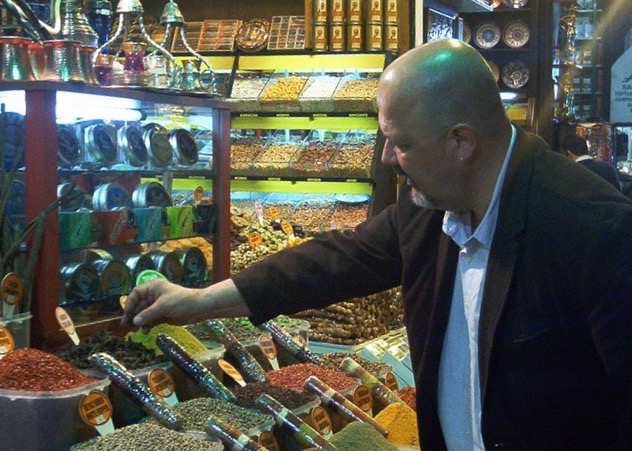The subtitle to David Whyte’s book Consolations is The Solace, Nourishment, and Underlying Meaning of Everyday Words. One of the words he unpacks is Istanbul. Though it makes me want to go find my They Might Be Giants CDs, I have never thought of Istanbul–the city or the word–as everyday.
Ginger and I got to go to Greece and Turkey in 2006, thanks to a Lilly Clergy Renewal Grant, and we spent some extraordinary days in Istanbul, Izmir, and Kayseri as we traced the steps of the Apostle Paul and then did a little wandering (and wondering) of our own. We walked through the Hagia Sofia, which was once a grand cathedral and is now a mosque, went underground to see the water system built by the Romans, crossed the bridge from Europe to Asia without leaving the city limits, and then walked the grounds and buildings of the Ottoman palace.
Whyte describes what was is an incredible memory for me:
Walking in the spice market of Istanbul after the antiseptic wrapping of the developed west we are enveloped by a shouting calling, hectoring, affectionate, begrudging, beseeching, laughing humanity.
Then he says, “We are never just one thing.”
In one of her books, Madeleine L’Engle talked about time stacking up on itself rather than stretching out, such that we are all the ages we are at one time. Her imaginative description of time led me to a short story I wrote for a creative writing class when I was getting my Masters in English. It was called “Waiting Room” and was told from the perspective of a man living with brain cancer and waiting for his test results.
Time stands on its head like a circus clown. We do not move forward, only up and down. We are every age we have ever been or will be in any and every moment, as if the moments of our lives happen simultaneously, though we experience them one by one.
I am fourteen at my brother’s military funeral;
I am seven putting a tooth under my pillow;
I am twenty-eight and my son has survived the surgery;
I am sixteen pulling out of the driveway for the first time;
I am fifty-four holding my first grandchild;
I am thirty stretching to touch a name on the Wall;
I am nine going to the principal’s office for cutting off Sally Jeffrey’s pigtail;
I am twenty-five laying down next to my wife for the first night in our first home;
I am seventy-two being pushed down a colorless hall to a semiprivate room;
I am eighteen registering for the draft;
I am forty-five with my Christmas bonus;
I am sixty-one at my wife’s funeral;
I am thirty-seven waiting to hear the results of my brain scan.
I am thirty-seven writing that story, and forty-nine spending the afternoon in the Spice Market, and sixty-three writing a blog post on a rainy, chilly New England spring evening.
We are never just one thing.
The more I repeat the sentence, I hear it differently. Rather than the we meaning you are never just one thing and neither am I, I hear it as we–as in all of us together–are never just one thing. To talk of who we are is to allow ourselves to wander (and wonder) through the spice market of our life together and take it in with all our senses.
We are never just
our fears
our wants
our appetites
our failures
our successes
our occupations
our hangups
our talents
our selves.
We are the imagination of God with skin on. We are capable of incredible love and significant damage. We can rise to the occasion and we can bring down the house. We can breathe life into one another and we knock the wind out as well.
I suppose I could go on in cute couplets for some time, but they set up something I don’t want to do and that is deal in polarities. We are not one or the other, us or them, which is the default American description for just about anything. To say we are never just one thing is not only saying we change, the way I can say I am a minister, a teacher, a chef, an Apple Creative, and an editor. Let’s go back to L’Engle’s sense of time. We are never just one thing in any given moment, or any given relationship. We are living all the layers at once. The hopes and fears and dreams and responsibilities and loves and obligations and disappointments and imaginings of all the years are met in us everyday.
Just like Istanbul. I guess it is an everyday word after all.
Peace,
Milton

I never tire of reading your comments, Milton. It’s time for another book. Stay well and stay safe!
Coming in October–more to share soon.
WOW
WOW
WOW
I want to stand in front of a stadium full and read this to them
wow
This one!!! THIS ONE !!! Thank you!
This, Brother Milton, is good spiritual exercise: listening to our lives, and our life together. I don’t like my auto-default a lot of the time, but it’s so easy. I just looked back at Psalm 139. You split the curtain from the bottom up. My Liege!
I found this piece comforting, and it is helpful to think of the lives of everyone we have “around” us this way. I say “around” because no one is around and I will be so glad to have them back….this reminds me to appreciate them more! Thanks again, Milton. I read you most days, but this piece was especially meaningful.